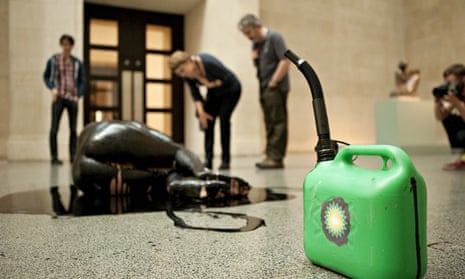The issues around arts organisations taking sponsorship from firms with a chequered ethical history have been with us over the centuries. And so with sit-ins at the Tate over BP sponsorship and recent protests at the National Gallery over Shell, the debate rages on.
But with arts organisations struggling for funds, and with the continued threat of further public cuts to come, a shift in moral values seems to be emerging; the trustees and leaders of arts organisations seem to be getting more risk-averse about accepting funding from corporate sources. So I wonder: is now the right time for us to be adopting the moral high-ground?
It’s understandable the trustees of arts organisations are concerned. Amidst a range of worries, the last thing an organisation needs is attention drawn to it for what might be considered as the wrong reasons. There is also an overriding fear that taking the wrong sort of private money from sponsors might affect funding agreements with public bodies such as Arts Council England (ACE).
From an audience point of view, cynics abound. Many believe that sponsorship of the arts is just an excuse for major corporations to brainwash us into thinking they care about society, although they do see sponsorship as an acceptable activity for legitimate businesses. However, it’s those firms where legitimacy seems to be a problem – the sponsors causing environmental damage or those adopting unethical recruitment practices – which are cause for debate.
With this in mind, we need to understand the position an organisation represents. The sponsor reports to private interest and the charitable arts organisation to the interests of the public. Sponsorship isn’t philanthropy; it’s a business exchange and in this context, if a sponsorship can’t work for either party, then it shouldn’t be entered into.
My very first job was fundraising for a youth music organisation. McDonald’s approached us with a £1m funding deal. The trustees at the time were not even prepared to enter into a dialogue with the sponsor on ethical grounds, so they were sent packing.
I still think about what could have been achieved with that £1m funding for music education in this country. Would McDonald’s have been my first choice of sponsor? Absolutely not. But surely, as long as the partnership was autonomous in terms of artistic practice, that investment could have done a lot of good. And before we get too moralistic, let’s not forget that the tobacco industry, with support from Philip Moore and others, enabled many of our music and dance organisations to be where they are today.
London 2012 gave us much to think about in relation to ethical sponsorship. Sainsbury’s received mostly good press for its sponsorship of the Paralympics, which played to the brand’s core values and gave the company chance to build on existing programmes such as Active Kids. In contrast, critics saw Atos sponsorship as lacking on moral grounds due to the view it had treated disabled people unfairly in delivering the “fit to work” programme.
This is the key point: when we debate the ethics of sponsorship, the only thing we really have to hang on to is values. The bottom line is that the trustees of arts organisations need to decide whether taking on a sponsorship will not only further an organisation’s artistic cause, but also whether the association can genuinely stand up against core values.
This is where the Tate’s position is so confusing. On the one hand, the organisation is committed to reducing its carbon footprint by signing up to the 10:10 campaign, but then continues its ongoing funding relationship with BP, an organisation that is well-known as one of the biggest emitter’s of carbon dioxide in the world. It’s at best a mixed message, for its own members and environmental support groups alike.
In my work in fundraising and enterprise as programme director of the ACE-funded Arts Fundraising and Philanthropy programme, I spend a lot of time working with boards to develop ethical fundraising policies. The starting point has to be that each organisation feels comfortable with its decision-making. An arts organisation must have a clear line and understand its core principles before negotiations with a sponsor start. Its position must be defensible.
A well-run board will have actively engaged in the ethical debate and will continue to return to the issue in much the same way as they should return regularly to the debate on core purpose, mission and values. The drafting of a straightforward set of ethical guidelines is becoming a key governance responsibility.
However, as a pragmatist and someone who supports organisations to raise funds and to develop resilient business models, I think that if we start to pick and choose too often, then it will be very hard to stop. If we make it too difficult for sponsors to enter into a relationship with the arts with threats over transparency and other issues, then we will hurt our cause.
So with the continued threat of further public cuts to the arts to come, we need a genuine and real debate about the ethics of arts funding. It’s rather surprising that sector-wide, such a debate hasn’t happened yet. But if we don’t achieve it, Henry Adams could be right: morality could yet prove to be a “private and costly luxury”.
More like this
Webchat roundup: what is culture’s value for our corporate sponsors?
Michelle Wright is founding CEO of Cause4 and is programme director of the Arts Fundraising and Philanthropy programme
Join our community of arts, culture and creative professionals by signing up free to the Guardian Culture Pros Network.









